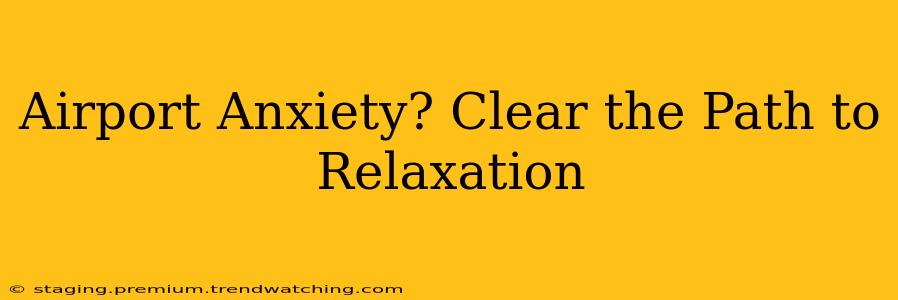Airports. For some, they're a thrilling gateway to adventure. For others? A breeding ground for anxiety. The crowds, the security lines, the potential for delays – it's a recipe for stress. But don't let airport anxiety steal the joy from your trip. This guide offers practical strategies to help you navigate the airport experience with calm and confidence.
What Causes Airport Anxiety?
Airport anxiety isn't simply about being afraid of flying (aviophobia). It's a broader experience encompassing a range of anxieties stemming from various factors. These can include fear of missing your flight, concerns about security procedures, claustrophobia in crowded spaces, or even the unfamiliar and overwhelming environment itself. Understanding the root of your anxiety is the first step towards managing it.
How Can I Reduce My Airport Anxiety Before I Even Get There?
Preparation is key! Proactive measures can significantly reduce stress levels.
- Plan Ahead: Allow ample time for travel to the airport, considering potential traffic delays. Check-in online, download your boarding pass, and familiarize yourself with the airport layout beforehand. Knowing what to expect can ease a lot of worry.
- Pack Smart: Organize your carry-on bag efficiently. Having everything you need readily accessible reduces the frantic searching that often exacerbates anxiety.
- Practice Relaxation Techniques: Incorporate mindfulness exercises, deep breathing, or meditation into your routine leading up to your trip. These techniques can help regulate your nervous system and build resilience to stress.
What if I'm Already Feeling Anxious at the Airport?
Even with the best planning, unexpected situations can arise. Here's how to manage anxiety in the moment:
- Find a Quiet Space: Many airports offer quiet zones or designated relaxation areas. Stepping away from the hustle and bustle can provide much-needed respite.
- Engage in Distraction Techniques: Listen to calming music, read a book, or engage in a relaxing hobby. Shifting your focus can help alleviate anxiety symptoms.
- Talk to Someone: Don't hesitate to speak to an airport staff member or a fellow passenger if you're feeling overwhelmed. Sometimes, simply talking about your feelings can provide comfort and reassurance.
Are There Specific Techniques to Help Manage Airport Anxiety?
Absolutely! Several proven techniques can significantly reduce airport anxiety:
- Cognitive Behavioral Therapy (CBT): CBT helps identify and challenge negative thought patterns contributing to anxiety. A therapist can guide you through exercises to reframe your thinking and develop coping mechanisms.
- Exposure Therapy: Gradually exposing yourself to anxiety-provoking situations (like crowded airports) in a controlled manner can help desensitize you over time.
- Mindfulness Meditation: Regularly practicing mindfulness can improve your ability to manage stress and anxiety in the present moment.
How Can I Prepare My Child for Airport Travel?
Traveling with children can add another layer of complexity to airport anxiety. Here's how to prepare your little ones:
- Explain the Process: Use age-appropriate language to explain what will happen at the airport. Role-playing can help familiarize them with the experience.
- Bring Familiar Comfort Items: Pacifiers, blankets, or favorite toys can provide a sense of security and comfort during travel.
- Plan for Breaks: Incorporate breaks into your travel plan to allow for rest and playtime. This can prevent meltdowns and reduce stress for both you and your child.
What are Some Common Fears Related to Airport Anxiety?
Many anxieties relate to specific aspects of air travel. Let's address some common concerns:
- Fear of Missing a Flight: Thorough planning and allowing extra time are your best allies. Set multiple reminders and confirm your flight details in advance.
- Security Concerns: Familiarize yourself with TSA regulations and pack accordingly to minimize delays and potential problems.
- Crowds and Confined Spaces: Strategic planning (arriving early or traveling during off-peak hours) can help mitigate exposure to overwhelming crowds. Remember those quiet zones!
Is Airport Anxiety a Sign of a More Serious Problem?
While many people experience some level of airport anxiety, persistent or severe anxiety may indicate an underlying condition like generalized anxiety disorder (GAD) or a specific phobia. If your anxiety significantly interferes with your daily life, consider seeking professional help from a therapist or counselor. They can provide a proper diagnosis and develop a personalized treatment plan.
This comprehensive guide offers practical strategies for managing airport anxiety. Remember that planning, preparation, and self-care are your best tools for a smoother and more relaxing travel experience. By understanding your triggers and utilizing the appropriate coping mechanisms, you can reclaim the joy of travel and leave airport anxiety behind.

